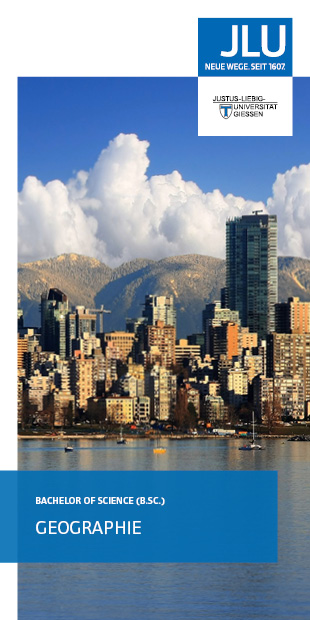Geography (B.Sc.)
Taught in German
Overview
-
Number of enrolled students
573 students are enrolled in this bachelor degree course (as of winter semester 2017/18).
Accreditation
since 18 August 2014.
- Overview
-
Concept and subject area
Characteristic of the subject is its function at the interface between the natural sciences and the humanities where "space" or the "spatial perspective" form the binding element. Thus during their studies learners concern themselves with elements from natural sciences (e.g. climate, vegetation and soil) and at the same time with social and economic aspects (population geography, economic geography and urban geography, etc).
Apart from the usual division into the two fields of physical geography and anthropological geography the strongly planning-oriented sub-disciplines (e.g. regional planning, community planning and environmental planning) are often seen – also very much the case in Giessen – as the independent aspects of applied geography. For practical work the geographers need a wide selection of methodological knowledge and techniques. The subject-specific study content ranges from cartography, via applied statistics, skills for empirical sociological research, EDP, geographical information systems (GIS), remote sensing and various methods used in cartography, up to climate measurement and chemical and physical laboratory analysis.
In the Bachelor's degree course 180 credit points (CP) are given in the Geography section, 36 points in the minor subjects and 6 points in the professional and interdisciplinary skills (Außerfachliche Kometenzmodule - the AfK-modules). This course of study is intended to instruct the students in basic, professionally qualifying skills and at the same time create the foundation for in-depth academic work in the Masters and doctoral courses. The BA course Geography at Justus Liebig University Giessen achieves both of these aims through a completely new concept of the study of Geography when compared to the diploma. The core of the new concept in the Gießen model of Geography is formed through the strict integration of training in methodology and the teaching of geographical knowledge in so-called "project modules" (see below "Composition of degree programme").
In this way the separation of content and methodology in the common "teaching-oriented" courses of study, is replaced through individual competences in the fields of methods, meaning "learning-oriented" structures. This effectively promotes both the suitability of graduates for their employment and their basic academic subject knowledge.
In the place of a school-style structure, as often discussed regarding Bachelor courses, the concept of the course is now that of a professionally qualifying one, concerned with the acquisition of individual skills and knowledge. In this way it recognizes the fact that many geographers are successful in the work market because of their methodological skills.Subject-specific prerequisites
Students should have an interest in natural sciences and humanities and social sciences. Basic knowledge in physics and mathematics and a good conceptual spatial imagination are helpful. A sound knowledge of English is recommended but not tested.
Composition of the Study Programme
- Degree BSc
-
Degree
Bachelor of Science (BSc)
- Duration of studies 6 Semester 180 Credit Points (CP)
-
Duration of Studies
6 Semesters - 180 Credit Points (CP)
- Composition of the Study Programme
-
Composition of degree programme
The curriculum is divided into a 2-semester introductory phase, a 3-semester core phase and a final semester:
The first year of studies (semesters 1+2) allows for basic lectures generating a sufficiently broad foundation for the following project study phase (semesters 3 to 5).
The core of the "Giessen Bachelor Model" is formed by the six project modules to be done in semesters 3 to 5, each with 9 credit points. Each project module is a content-integrated course with the aim of promoting individual acquisition of methodological knowledge and skill, which consists of- an introductory, content-based class (module block 1).
- a methodological block (module block 2). The methodological block, e.g. Statistics for Geographers or GIS or Laboratory Methodology, deals with the basics of each method and explains these, using an example of their application from the subject of the relevant class.
- a practical class (module block 3) in which individual tasks are dealt with using the methods and content that have been learned, with learners working individually and on their own responsibility
- a term paper and a presentation.
The project modules of this pattern belong to the group in the 3rd and 4th semesters (basics), those for advanced learners (4th and 5th semester) as well as on-site and excursion modules. Project modules offer the possibility of integrating knowledge from the minor subjects in the topic being dealt with individually, the presentation and the term paper.
The modules of the introductory phase – a survey:
1st semester 2nd semester Propadeutics (9 CP) Geoinformatics (9 CP) Introduction to physical geography / climate geography (6 CP) Introduction to anthropogeography / economic geography (6 CP) Optional:
quantitative and qualitative methodology/empirical social research OR methodology of physical geography
Introduction to area planning, transport geography and mobility research (6 CP)
Core phase
In the 3rd, 4th and 5th semesters the project-based studies follow. 2 project modules must be done each semester and each project must have a volume of 9 CP.
For example, project modules can deal with the following topic areas:- teaching and study projects with an excursion or mainly in the area of geologic field work
- economic/geographical basics project "Regional-economic analysis of China"
- climatic/geographical basics project "Climatological area analysis and evaluation of locations, using examples in Hessen"
- economic geographic advanced project, "location analysis in retail"
- advanced project in area planning "Area planning for an urban renewal area"
- project "Excursion for geographic development research"
- physical-geographic project "Paleo-Environment construction in middle Hesse on the basis of sediment archives"
Final phase
In the 6th semester or, if wished, at an earlier point in the course, a vocational training of 11 weeks (15 CP) is completed. Studies are then completed with the Bachelor's thesis (12 CP) and a parallel seminar (3 CP).
Modules in one big or two small minor subjects (36 CP for the "big minor subject" and 18 CP for the "small minor subject") and in electives (AfK - 6 CP) will be distributed over the course (about 10 CP per semester).Possible minor subjects are:
- public law
- economics: business administration, economics, economy or economics with the emphasis on transformational economics
- political science
- sociology
- agricultural economics
- environmental management
Other minor subjects to the extent of 18 CP can be approved on request.
Bachelor's Thesis
In the thesis the students are to demonstrate that they are able to work independently for a limited period on a concrete, clearly defined topic and to present this work to teachers and fellow students.
Practical application
In the 6th semester or, if wished, at an earlier point in the course, a vocational training of 11 weeks (15 CP) is completed.
Application
- Commencement of Studies in the Winter and Summer Semester
-
Commencement of studies
Summer semester and winter semester
- Entrance Requirements Abitur ohne Praktikumsnachweis
-
Entrance requirements
- Applicants must have an Abitur (German school leaver's examination for university entrance) or equivalent. More on this...
- Certification of a pre-professional practical period is not required.
-
Special regulations apply to foreign applicants or those who gained their university-entrance qualifications abroad. Read more...
- Application not limited
-
Application for admission and registration
- The intake capacity of this degree programme is not limited internally by the university.
- Applications must be received by the JLU Student Secretariat by 15th January for the summer semester and 15th July for the winter semester. More on this...
- Special regulations apply to foreign applicants or those who gained their university-entrance qualifications abroad. Read more...
- Application period
-
Please note that the application period for the Bachelor's course can be extended. This information will be published here (in German).
Career Options
- Career Options
-
Options for further study at JLU
The following consecutive Master's degree is offered by JLU:
- Economic Geography, mobility and Spatial Development Policy (MSc)
- Human Species - Climate - Environment (MSc)
Career options / Job market
The professional prospects of Bachelors students: it must be admitted that at present the situation is still problematic because the Bachelors degree is still relatively young and the job market is still firmly established in its present form. For now, typical areas of employment for geographers must be sought out from the experience of diploma graduates.
To date the main employers have been, on the one hand, the various levels of the public service and, on the other, various firms in the spectrum of private enterprise (see survey). Added to this there are many geographers working independently in the areas listed below. And finally, there is another large area namely teaching at one of the various levels of education.
Typical working areas in the public service:- construction management
- county planning
- land-use planning
- regional planning
- city planning
- traffic planning
- logistics
- real-estate industry
- protection of nature
- ecological research, protection strategic
- environmental assessment
- environmental planning
- economic promotion
- developmental research
- location research
- development planning
- universities
- tourism
- information bases etc.
- libraries and archivals
- adult vocational training
- supply and waste disposal
- landscape planning
- public relations activities
Working in private industry or independently, geographers are active in the following areas, for example:- publication of atlases and schoolbooks
- vocational training
- consulting
- waste disposal companies
- retail/location planning
- business chains (all sectors)
- specialized publishing houses
- remote sensing
- tourism
- radio and television
- free planning offices
- strategic environmental assessment
- chambers of commerce/associations
- encyclopedia publishing houses
- market research
- marketing/logistics
- oil businesses
- public relations
- planning and consulting companies
- press
- data bases
Detailed Information about professional fields, potential areas and possibilities of employment is published by the Deutsche Verband für Angewandte Geographie (German applied geography association).
Further Information
- Further Information: Documents
-
PDF documents for the courses of study
- Flyer (in German)
- Study guide (in German)
Examination- and study regulations
- Special regulations (in German)
(with module descriptions and module plans) (in English)
(Please note that only the German version of the modules is offical and legally binding. The english Version is for informative purposes only.) - General study regulations for modular and multi-stage study programmes
Courses offered in the course catalogue
- Electronical course catalogue (in German)
- Bachelor's Degree Programmes of Faculty 07
- International pages
-
Please have a look at our International Pages for more information in English.
- Any Questions
-

Any Questions?
Information- and advisory services of JLU can be found under the category “contact” on this page!
- Help
-
Do you need assistance in choosing the right courses of study?
- Offers: Courses of study
-
Which courses of study suits me best?

Ask Justus offers information for prospective students
Events for prospective students

There is a whole range of events offered by JLU, current events can be found under “news”:
www.uni-giessen.de/studium (in German)
Contact
- Contact
- Subject Advisors
- Subject Advisors
-
Dipl.-Geogr. Michael Hollenhorst
Department of Geography
Schlossgasse 7, Room 310
Phone: 0641-99-36246
email: michael.hollenhorst@geogr.uni-giessen.de
- Central Study Advisor
- Beate Pitzler
- Central Student Services
-
- Students office →
(for formal matters like matriculation) - Central student advisory office
(advice for students & prospective students) - Hotline Call Justus
(first contact for all matters pertaining to studies) - International office →
(for international students)
- Students office →

